




 |
   |
 |
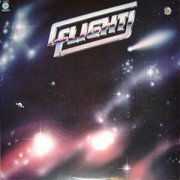 |
Flight (1975, 42.05) ***½/TT½In FlightMake a Miracle Let's Fly Away Latin Dippy Do Rhapsody to You Falling in Love Ease of Confusion Theme to the Stratosphere |
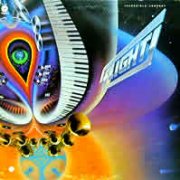 |
Incredible Journey (1976, 37.05) ***½/½Music is1929 First Impression Mystery Man 2003 Visions of a Dream The Sands of Time Rock'n'Roll Star |
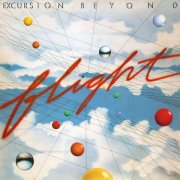 |
Excursion Beyond (1981, 30.09) ***/TExcursions BeyondMusic Razzmatazz A Thing for Julie Shake Your Body (Down to the Ground) The Rumble Face to Face Jett Lagg Inca Innuendo |
Current availability:
Mellotrons used:
Flight were a most peculiar mixture of musical styles; sort of easy listening Latin jazz prog (!), smooth vocals sitting alongside a brass section and prog keys. For a major label outfit, information about them is surprisingly difficult to find; I mean, try Googling 'Flight'... 1975's Flight is best when the vocalist shuts up and lets the band do their brass-fuelled prog/fusion thing, as on fiery, jazz-inflected opener In Flight and the vastly-better-than-its-title-would-suggest Latin Dippy Do. On the keyboard front, Jim Yaeger sticks mainly to Moog, string synth and Mellotron, frequently using the latter two in the same song, sensibly concentrating on their different strengths. All credited tracks above have reasonable amounts of Mellotron strings, with choir on a couple of tracks, though the album's outstanding keys work is to be found in the red hot synth playing, with ripping solos on several tracks in true fusion style.
There's little stylistic change on the following year's Incredible Journey, although the album is possibly slightly less manic than its predecessor. I'm not sure if there's some sort of concept thing going on here, but two of the album's highlights are 1929 and 2003, with particularly good guitar work on the latter. Yaeger plays mainly string synth this time round, although he whips out a blistering piano solo at the end of 1929; the same track features the album's only Mellotron work, with a handful of string chords, sounding particularly rich compared to his considerably greater use on Flight, making it ironic how little it's used here.
Splits and bad luck made for a five-year gap before Flight's last album, 1981's Excursion Beyond. Although the trumpet is still present and correct, just about all of the band's Latin influences are gone, leaving a largely instrumental mainstream fusion sound with just one vocal track, Face To Face. To be honest, nothing particularly stands out and I can't really imagine this appealing to anybody but early-'80s fusion fans; there's certainly none of the groundbreaking genre-splicing of their first two albums. Yaeger's Mellotron is used a surprising amount, with background strings on the first three tracks and Jett Lagg, with a similar flute part on The Rumble.
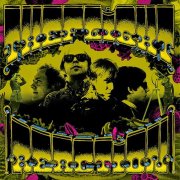 |
The Flight Reaction (2014, 37.34) ***½/TT |
|
| Falling Through Color Take Your Time Every Time You Die Nothing Lasts Love Will See Us Through Slide Away Running Out of Mind Get Ready for Take-Off |
Eight Hours Ago Mourning Light The World is Black Your Smile |
|
Current availability:
Mellotron used:
The Flight Reaction's eponymous 2014 debut (now looking more like their lone release) marries garage rock and early psych, circa '65-66, with such accuracy that you'd be hard-pushed to tell it apart from an artefact from the actual era. Best tracks? It's all good, in a Byrds-meets-Seeds kind of way, but perhaps frantic opener Falling Through Color, Running Out Of Mind and Mourning Light (previously a single) pip the rest to the post.
David Svedmyr (Lisa o Piu, Lüüp, others) plays his MkVI Mellotron, with strings on Every Time You Die and Love Will See Us Through and strings and cellos on Eight Hours Ago. On relistening to this, I'm stunned that I ever thought he was using samples; the 'wobblies' on Eight Hours Ago are more authentic than authentic, as is the music.
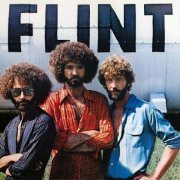 |
Flint (1978, 40.05) **½/T½ |
|
| Back in My Arms Again You Got it All Wrong Too Soon to Tell Love Me Like You Used to For Your Love Keep Me Warm One of Me Better You Than Me |
Rainbow You'll Never Be the Same |
|
Current availability:
Mellotron used:
Flint (named for their Michigan hometown) were the bedraggled, war-weary remains of Grand Funk Railroad, after losing frontman Mark Farner and his wild, shirtless lyrics. Mel Schacher's bone-rattling bass, Don Brewer's competent drumwork (and more than competent vocals) and, unmentioned by Homer Simpson, keys man Craig Frost licked their wounds, regrouped and renamed, releasing their sole, eponymous album in 1978. It doesn't actually sound much like The Funk at all, being far, er, funkier than that band ever managed, if not in an especially good way, sounding more like long-forgotten white funk/soul acts like Rare Earth than, say, The Family Stone.
Most of Flint's material is pretty anodyne stuff, to be honest, occasionally letting rip (chiefly on Better You Than Me), but too often coasting along, letting the brass section and girly backing singers take the strain, guest guitarists including Todd Rundgren and Frank Zappa, both former Grand Funk producers. Frost plays Mellotron on two tracks, with rather limited string use on their misguided cover of the Graham Gouldman-penned Yardbirds hit, For Your Love and more upfront strings on closer You'll Never Be The Same, the album's one proper Mellotron track.
See: Grand Funk Railroad
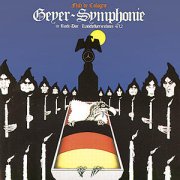 |
Geyer-Symphonie (1973, 42.46) ***/½La Grande Tristresse (Requiem)Danse Macabre (Totentanz) Serenade des Bautours (Leichenschmaus) |
Current availability:
Mellotron used:
Floh de Cologne sit fairly and squarely in the krautrock genre, as much as anything that diverse could be styled a 'genre' in the first place. Gloomy orchestral backing? Check. Mad German-language narration? Check. Genre-hopping side-long 'songs'? Check. Despite having relatively little in common with the likes of Can, Faust or pre-commercial success Kraftwerk, never mind the druggy cosmic folk-rock of Witthüser & Westrupp, Geyer-Symphonie's bonkers mélange of styles is going to appeal more to fans of those bands than anyone else and many of them will probably balk at its oddness. Actually, one quite mainstream German band who do spring to mind as having possibly been influenced by the madness on display here are Grobschnitt and their resident nutter, drummer Eroc, a man not unused to yelling meaninglessly in German.
Markus Schmidt plays Mellotron on Danse Macabre (Totentanz), which features a brief burst of queasy, seasick pitchbent strings, although that would appear to be it on the Mellotron front. Geyer-Symphonie is an album for those who feel that The Dream by Gracious! is boringly normal and La Dusseldorf and Neu! are maybe a little passé these days. It's difficult to say whether it's good, bad or indifferent, unless you're doing the same drugs as the band and even then, it's probably rather inconclusive. An interesting curio, then, but not worth it for the Mellotron.
The Flower Kings (Sweden) see: |
 |
 |
7" (1967) ****½/TTT½ Let's Go to San Francisco, Part 1 Let's Go to San Francisco, Part 2 |
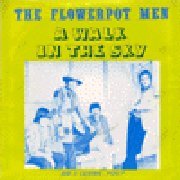 |
7" (1967) ***½/TT A Walk in the Sky Am I Losing You |
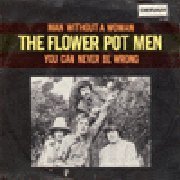 |
7" (1968) ***½/TT½ A Man Without a Woman You Can Never Be Wrong |
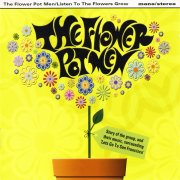 |
Listen to the Flowers Grow (2007, recorded 1966-69, 59.49) ***½/TTT½ |
||
| What's the Matter With Juliet (John Carter/Ken Lewis demo) Waiting Here for Someone (Neil Landon) I Couldn't Spend Another Day (Carter/Shaw/Keen) Rain Rain Rain (Ministry of Sound) Let's Go to San Francisco, Pt. 1 Let's Go to San Francisco, Pt. 2 |
A Walk in the Sky Am I Losing You A Man Without a Woman You Can Never Be Wrong Hello Hello Hello (John Carter demo) Piccolo Man (Friends) Life is Living (Ministry of Sound) Mythological Sunday (Friends) |
Letter to Josephine (Haystack) Pantomime People (Haystack) A Night to Be Remembered (Dawn Chorus) Let's Go Back to San Francisco, Pt. 1 (Beautiful People) Let's Go Back to San Francisco, Pt. 2 (Beautiful People) |
|
Current availability:
Mellotrons used:
The Flower Pot Men (named after the BBC's Bill and Ben children's programme, for non-UK readers) were a studio-based outfit, formed by the writing team of John Carter and Ken Lewis, revolving around the vocal talents of session singer Tony Burrows, later to be the voice of similar studio outfits Edison Lighthouse, White Plains et al. Many musicians can lay claim to being members at one time or another, but most of them (including Nick Simper and Jon Lord, later of Deep Purple) were only in the touring outfit, hastily assembled to cash in on the success of their debut single.
Said single, Let's Go To San Francisco, has gone down as a classic of the era, although the writers laughingly admitted that they'd never been there and were quite blatantly jumping on the flower power bandwagon. Apart from a 'lodge in your brain' melody, the track features a beautiful Mellotron flute line running through the whole thing, plus faint string and brass parts. The b-side was a continuation of the flip, the complete track available on various compilations. Absolutely essential. Second single, A Walk In The Sky, follows a similar psych-pop path, though without being remotely as iconic as 'San Francisco'. It's a good song, nonetheless, featuring a nice Mellotron string line, though less overtly than the flutes on its predecessor, a brief Mellotron trumpet solo on its b-side. Nothing on single no. 3, A Man Without A Woman, but it sounds like both strings and an unidentified solo brass sound on its flip, You Can Never Be Wrong. Now, to confuse the issue considerably, the fourth single by the 'band', Piccolo Man, was released under the name Friends, but has been (sensibly) anthologised along with the Flower Pot Men material. Although it's Mellotron-free, its flip, Mythological Sunday, opens with a flute line, adding strings later on.
2007's Listen to the Flowers Grow is a good overview of Carter and Lewis' work of the period, including the Flower Pot Men and Friends singles, various demo tracks and tracks from their other projects, including The Ministry of Sound (decades before the name was reused) and others. Wonderfully, we also get both parts of the cash-in on the cash-in, Let's Go Back To San Francisco, recorded in 1969, yet, bizarrely, released at the height of the psychedelic revival in, er, 1981. It even uses the original song's descending chord sequence, but gets some nice Mellotron in, so all is forgiven. One 'new' Mellotron track is The Haystack's Pantomime People, flutes and strings splattered liberally across its length. Previous compilations have included rather weak non-single tracks, some being far too close to the middle of the road for comfort, as are a handful included here, not least Am I Losing You, but the bulk of the set shines a welcome light on a neglected corner of UK '60s pop.
So, Listen to the Flowers Grow's a good starting place for the Flower Pot Men (who said "And a good finishing one, too?"). They may have been a bit cheesy and decidedly 'inauthentic', but they produced a handful of great psych/pop singles, so I'll let them off the hook. Just this time, you understand... Incidentally, in 2000, a previously-unreleased selection of tracks was released as The Peace Album, but the only Mellotron track is Friends' Mythological Sunday, so I shan't bother reviewing.
See: John Carter | Friends | Beautiful People | The Haystack | Ministry of Sound
 |
Hex (2000, 39.21) ***/½On the HillYellow Afternoon Goodboy Everything Turns Fine Line Inanna Thief So Easy No Guarantees |
Current availability:
Mellotron used:
I believe Hex is yoga practitioner Suzy Flowers' sole album to date, a gentle singer-songwriter record, highlighting her pure voice and way with a tune, at its best on Yellow Afternoon and So Easy. This is a case-study in how to work in this genre without producing the kind of cheesy nonsense churned out by about a million other practitioners.
Midnight Oil's Jim Moginie produces and plays his Mellotron on Goodbye, if only just, with what sounds like background strings on the track. Not a reason to buy this album, then, although Flowers' songs are.
 |
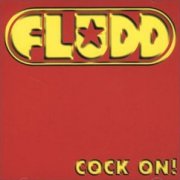 |
...On! [a.k.a. Cock on!] (1972, 35.06) ***½/TTT |
|
| C'mon C'mon Yes! Always Be Thinking of You Down! Down! Down! Cousin Mary Home-Made Lady Ticket to Nowhere Can You Be Easy |
All Sing Together Gratitude |
||
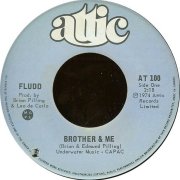 |
7" (1974) ***/T½ Brother & Me Piece of Alright |
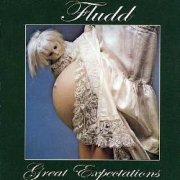 |
Great Expectations (1975, 33.17) **½/½ |
|
| What an Animal! How's Life Breaking? The Way You Get Around Me My Old Man I Held Out Boarding School Dance Gypsy Dance Brother and Me |
Too Good Tonite Smile on! Great Expectations |
|
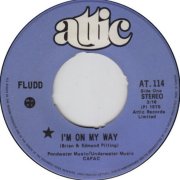 |
7" ( 1975) ***/TT I'm on My Way Great Expectations |
Current availability:
Mellotrons used:
Fludd were a Canadian glam rock band, although, like many such from the time, with hindsight, their music mostly sounds like yer average early '70s mainstream rock, once the glitter and stackheels are out of sight. 1972's ...On! was originally meant to be called Cock on!, but label execs got cold feet over the idea and nixed it, leaving the album with a rather meaningless title. It's a perfectly respectable effort, shifting between the glam-rock of opener C'mon C'mon, the good-time Yes! and the blues-rock of Home-Made Lady, although the oddest track is the straight country of Cousin Mary, which picked up loads of airplay after being stuck on the flip of a single, thus finding its way to record stations. Keys man Peter Csanky tells me he owned no fewer than three Mellotrons at the time, a MkII, an M300 and an SFX console. I know he used the M300 on Cousin Mary, but it's hard to say if that's the same machine used on the other highlighted tracks above. Anyway, strings all round, although I suppose there could be other Mellotronically-generated orchestral sounds used, too.
Csanky was replaced by future Saga chap Peter Rochon (Saga were originally a Fludd spin-off), who played keys for the rest of their career, including a 1974 non-album Mellotron strings-heavy b-side, Piece Of Alright (now on YouTube). The following year's Great Expectations is a pretty dullsville effort with no obvious highlights, veering between tired, mainstream pop/rock and tedious rock'n'roll pastiches, its nadir being the brief barroom boogie Smile On!, most likely a reference to the mangled title of their debut. Is there a best track? Not really, although opener What An Animal! is almost a carbon-copy of the lighter end of Styx, right down to the vocal style (let's ignore the out-of-place brass section). Rochon definitely adds background Mellotron choirs to What An Animal! (although the backing vocals later in the track are real), with more of the same on The Way You Get Around Me, although the background something heard on the closing title track could be just about anything. The only other Fludd Mellotron is a '75 single, I'm On My Way, a passable enough pop/rock effort featuring a nice Mellotron strings part (doubtless M400 by this time), compiled onto From the Attic.
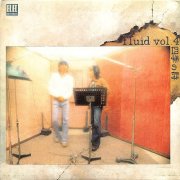 |
Fluid Vol. 4 (1974, 45.13) ***/T |
|
| Fluid Vol. 4 Hina Matsuri Haru Takenawa Sentoruisuburūsu Hayaku Kaeritai Love Song Shōnen Kumano Jinsha o Kayotte |
Kimagure Rapusodi Shiki no Uta Toshinose |
|
Current availability:
Mellotron used:
According to Discogs, Fluid were a 'folk duo', active throughout the '70s. I strongly suspect that 1974's Fluid Vol. 4 wasn't named in honour of Black Sabbath's opus of a couple of years earlier, being light pop/folk, at its least dull on the upright bass-fuelled jazz/blues of Sentoruisuburūsu and the violin-led Love Song.
John Yamazaki plays Mellotron on Shiki No Uta, with a lush string accompaniment running through the song. Like most Japanese releases, this will be a bugger to track down anywhere else, but it's on YouTube, should you feel the need to hear the track.
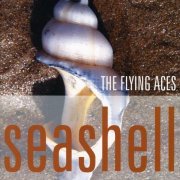 |
Seashell (2002, recorded 197?-197?, 50.40) ***/½ |
|
| Seashell (vinyl version) Waiting at the Station I Got Beautiful You Elephant at My Side Larry Magic Carpet Ride All the Little Things Real Fantasy |
Moonlight Kiss Atlantic Roller Holding Back the Tears Seashell (tape version) |
|
Current availability:
Mellotron used:
It seems The Flying Aces were a Man/Help Yourself-related pickup band based around Martin Ace and his wife Georgina, along with various members of both bands. Active (apparently) from 1972-74 and again from 1975-77, a collection of their recordings (dates unknown), Seashell, finally crept out in 2002, in response to 'fan pressure'. It's hard to say what they were like live, but this compilation shows, at heart, a pub-rock outfit, like a less countryish Brinsley Schwarz, perhaps, at their best on Elephant At My Side (once you get past the spoken-word intro), the psych-ish Magic Carpet Ride and the 'tape version' of the title track that closes the set. Sadly, Larry (has this anything to do with distant associate Larry Wallis?), while a decent enough song, is spoilt by its lengthy, off-key guitar solo. Or am I missing some private joke?
Someone (Eyes of Blue/Man keyboard player Phil Ryan?) plays a brief, but very upfront Mellotron flute part on Real Fantasy, possibly (since I have no recording details) the Rockfield Studios machine. This may be worth hearing, just possibly, for Man fans who have to hear every note recorded by their idols. As for the rest of us? Not really, no. Scrapes three stars. Incidentally, four of these songs (but not Real Fantasy) also appear on Help Yourself's Happy Days odds'n'sods collection.
See: Help Yourself
 |
5-4-3-2-1-0 (1977, 46.13) **½/T |
|
| Hatena i Imēji Boku wa Uchū Hikō-Shi part I Yōnen-Ki Kara no Dasshutsu Mujakina Shōri Boku wa Uchū Hikō-Shi part II Yume no Penī Kyandīzu Iradachi Ai no Ashiato |
Tsukami Kirenai Shabontama 10-Sai no Tanjōbi Yojireta Tamashī Boseki o Sora e 5-4-3-2-1-0 |
|
Current availability:
Mellotron used:
Flying Kitty Band's lone LP, 1977's 5-4-3-2-1-0, is actually credited to Flying Kitty Band featuring Ogura Kei, Hoshi Katz and Yasuda Hiromi, the three featured vocalists, for what it's worth. By and large, it's an album of mainstream balladry, with a few more upbeat pop numbers, occasional highlights including Boku Wa Uchū Hikō-Shi Part II, some nice guitar work on Yume No Penī Kyandīzu and the standalone keys that close the record.
With no fewer than eight credited keyboard players, it can only be a matter for conjecture which one plays the chordal Mellotron strings on brief opener Hatena I Imēji, although, going on past form, it seems likely it was Jun Fukamachi.
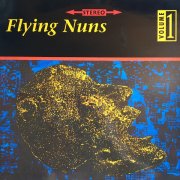 |
CDS (1993, 10.05) ***/½ Yard Shirt Mines Underwater |
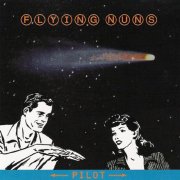 |
Pilot (1995, 20.15) ***/½SubmarineFrank Shades Carousel of Freaks Life on the Ground |
Current availability:
Mellotrons used:
I don't know why Boston's Flying Nuns nicked the name of an iconic Kiwi label; perhaps they wanted to be on it? Anyway, their raucous-yet-melodic, post-punk sound apparently bears comparison with Mission of Burma from the same city. 1993's Yard (both a two-track 7" and a three-track CD EP) was their second release, competent, but (given their lack of subsequent profile) probably no better than that. Fort Apache Studio's Mellotron turns up on Shirt, producer Brian Dunton adding faint flutes to the track that do little to enhance it.
They followed up with 1995's Pilot, a full EP this time, in a similar vein to its predecessor, albeit marginally more experimental in places. It's at its best on Shades, but I think you've really got to be into this stuff to gain anything much from either of these releases. Mellotron from Dunton again, with chordal strings on Shades, once more, to no great effect. After a decade together, Flying Nuns finally released an album in 2002, the Mellotron-free Everything Impossible These Days, then quietly disappeared.
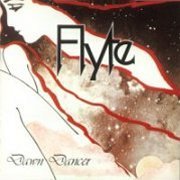 |
Dawn Dancer (1979, 39.54) ***½/TTT½WomanHeavy, Like a Child Grace You're Free, I Guess Aim at the Head Your Breath Enjoyer King of Clouds Brain Damage |
Current availability:
Mellotron used:
Flyte were a Dutch/Belgian conglomerate, influenced by Camel and Kayak, amongst others, using a melodic, short-ish song format that shouldn't tax the average listener too much. To be honest, I find Lu Rousseau's vocals on Dawn Dancer quite hard to take, with the result that I prefer the album's instrumental sections. The song titles and lyrics leave quite a bit to be desired, too, but I presume, like most progressive bands from their respective countries, they didn't wish to sing in their own language.
Musical quality aside, there's loads of Leo Cornelissens' Mellotron for your listening pleasure, five of the eight tracks featuring fair amounts of strings and choir. Woman and Your Breath Enjoyer are probably the best Mellotron tracks, though they all feature enough to be worth hearing. To be honest, though, without the Mellotron, Dawn Dancer would be a decidedly average album, although better than, say, Womega's.
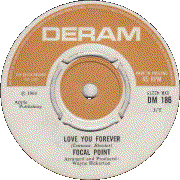 |
7" ( 1968) ***/T½ Love You Forever Sycamore Sid |
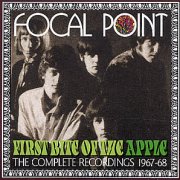 |
First Bite of the Apple: The Complete Recordings, 1967-68 (2005, 59.38) ***½/T |
||
| Miss Sinclair Sycamore Sid Hassle Castle Never Never Lonely Woman Far Away From Forever Love You Forever Tales From the GPO Files |
Mckinley Morgan the Deep Sea Diver Falling Out of Friends Girl on the Corner Goodbye Forever This Time She's Leaving 'Cept Me Miss Sinclair (demo) Miss Sinclair (alt.version) |
Hassle Castle (demo) Never Never (alt.version) Reflections (demo) Reflections |
|
Current availability:
Mellotrons used:
The Liverpool-based Focal Point made their way to London in 1967, as did so many music biz hopefuls; unlike most, however, they attracted the attention of The Beatles' Apple label, eventually releasing their sole single, Love You Forever, on Decca's new Deram imprint in 1968. It's a decent enough psych/pop effort, although it lacks the weirdness that characterises the era's best work, which may or may not have worked against it, as it wasn't a hit. They headed back to Liverpool, finally splitting the following year, despite having recorded a slew of demos in various studios, pretty much the last anyone heard of the band for several decades.
Thirty-six years on... Those nice Kissing Spell people released First Bite of the Apple: The Complete Recordings, 1967-68 in 2005, containing every existing recording of the band, most seemingly dug out from mouldering heaps of junk in attics across the land. The end result is a very pleasant, light psych offering, that's never in any real danger of overtaking the brand leaders in popularity, although several of its tracks (not least the already-available Sycamore Sid, the jaunty Mckinley Morgan The Deep Sea Diver and the gentle Girl On The Corner) are worth hearing for fans of lesser-known UK psych. Keyboard player Tim Wells adds Mellotron to a couple of tracks, with strings (and flutes?) on Never Never and strings and vibes on Love You Forever, although most of the band's output was recorded in Mellotron-free studios, sadly.
Focus (Netherlands) see: |
 |
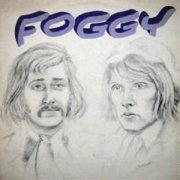 |
Simple Gifts (1972, 40.31) ***/TT½ |
|
| Simple Gifts Baby Day She's Far Away My Song Let it Be Madelaine I Wasn't Born to Follow Kitty Starr |
Was it Only Yesterday How Come the Sun Nobody Knows The Very First Time Take Your Time Old Moot Hall Simple Gifts... |
|
Current availability:
Mellotron used:
Foggy (originally Foggy Dew-o) were the duo of Danny Clarke and Lennie Wesley, who had a strong Strawbs connection over the course of their three-album career. Future Strawb Brian Willoughby played with them briefly, they covered no fewer than four Strawbs songs on Foggy Dew-o's second album, Born to Take the Highway and half of them guested on the sole Foggy album, 1972's Simple Gifts.
It's a reasonable enough folk-rock release, if nowhere near the level of Fairport and Steeleye, or even the better lesser-known acts (Trees, Mellow Candle). Much of the album has a faint country flavour, which doesn't do it many favours with the benefit of hindsight, while ill-advised covers (The Byrds' I Wasn't Born To Follow, The Beatles' Let It Be) would have been better left quietly on the shelf. The occasional song stands out, notably the Eastern-flavoured She's Far Away and the opening and closing versions of the title track, an old Shaker hymn whose tune was annexed for Sydney Carter's Lord Of The Dance, but I'm afraid there's far too much filler here for this to be regarded as in any way a lost classic.
Like most of The Strawbs' contemporaneous releases, there's some Mellotronic input here. Then-Strawb Blue Weaver plays full-on strings on My Song and Kitty Starr, plus flutes (under a real one) on Old Moot Hall, although they don't always enhance the material in quite the way you might expect. Top playing from Blue, though, with a high-speed flute run in the last-named that you'd have trouble doing on a well-gigged machine. All in all, then, a passable album with some nice Mellotron work, but nothing you desperately need, unless you have to a) own every British folk-rock album from the early '70s, or b) have to own every album containing Mellotron. Who said, "Me"?
See: Strawbs
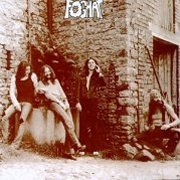 |
Foghat (1972, 37.44) ***½/TI Just Want to Make Love to YouTrouble, Trouble Leavin' Again (Again!) Fool's Hall of Fame Sarah Lee Highway (Killing Me) Maybelline A Hole to Hide in Gotta Get to Know You |
Current availability:
Mellotron used:
It may surprise some of you to learn that Foghat were actually British, formed by three ex-members of Savoy Brown, obviously feeling, from the evidence here, that their parent band were lacking a little in the energy stakes. On their eponymous debut, vocalist/guitarist 'Lonesome' Dave Peverett (very British...) led his crew through a rocking set; short on originality, it rocks far harder than the band they'd just left, with a cool twin-guitar attack, Peverett and Rod Price trading 'licks' with abandon. Dave Edmunds' production helps things along, too, stopping just the right side of pastiche.
No-one's credited with keyboards (was it Edmunds?), although their version of Chuck Berry's Maybelline has some ferocious piano playing and a more straightforward part on lengthy closer Gotta Get To Know You, along with some Wurly and subtle Mellotron strings.
See: Savoy Brown
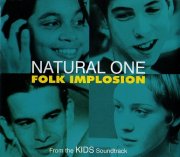 |
Natural One (1995, 13.18) ***/T½Natural OneCabride Nothing Gonna Stop Simean Groove |
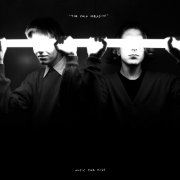 |
Music for Kids (2023, recorded 1995, 61.46) ***/T |
|
| Natural One Nothing Gonna Stop Wet Stuff Jenny's Theme Crash Daddy Never Understood Simean Groove Nasa Theme Cabride |
Raise the Bells Insinuation Burning Paper Checking in Wide Web Park Dub Natural One (Unkle remix) Nothing Gonna Stop (instrumental) Insinuation (Dust Brothers remix) |
|
Current availability:
Mellotron used:
OK, this one's a bit complicated. The Folk Implosion are a lo-fi American indie outfit, consisting of Lou Barlow (Dinosaur Jr./Sebadoh) and John (H.) Davis, formed to give Barlow an outlet for his non-Sebadoh leanings. After an early cassette and a full album, 1994's Take a Look Inside......., they recorded a batch of material at Fort Apache studio, effectively piggybacking onto the sessions for Sebadoh's Bakesale, according to their Bandcamp page. The results found their way onto various releases, including second album Dare to Be Surprised and the various artists (though chiefly TFI) Kids soundtrack, which gave them a hit single, Natural One, all relevant Kids material being compiled onto 2023's Music for Kids. While still lo-fi, it's far more listenable than the album material, fitting squarely into the 'offbeat '90s indie' non-genre.
Davis says on his website, "I've never worked with real violin or cello, or even virtual ones, before. The closest I got was a Mellotron that Folk Implosion used on a few songs we did at Fort Apache in 1995". It only appears on one Natural One track, Cabride (or Cab Ride), with upfront flute and string parts, while we also get a brief burst of volume-pedalled strings on the punky Daddy Never Understood. TFI have to be applauded for straightening out the soundtrack mess (albeit almost thirty years later); if only more artists put this much effort into curating their back catalogue. Yes, AC/DC, I'm looking at you. I've also added an entry for Kids under OSTs, for what it's worth.
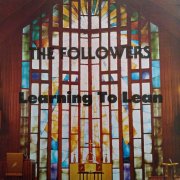 |
Learning to Lean (197?, 30.29) *½/TT½ |
|
| Learning to Lean One Day at a Time Peace in the Valley Meet Me Over on the Other Side Only Jesus Can Satisfy Your Soul Jesus How I Love You Heaven's Sounding Sweeter All the Time Gonna Shout All Over Heaven |
He Was There All the Time Whatever it Takes |
|
Current availability:
Mellotron used:
Family group The Followers (well, they're clearly not leaders) were yet another in a seemingly inexhaustible seam of midwest Christian acts who felt the urge, not only to record some of their horrid oeuvre, but to actually foist it on the general public. I sometimes feel there should be laws against such things. Call it... I dunno. Anything. Just make them stop. Learning to Lean is a half-hour paean to refusing to take responsibility for one's own actions, or is that merely my interpretation of the idea that it's good to 'lean', rather than stand on your own two feet? This particular bunch of besuited (and evening-dressed, in Mona Sinclair's case) creeps can, at least, sing in tune, which puts them several notches above some of their competitors, but their church-hall-piano-and-close-harmony sound could easily be from twenty years earlier than this effort's unstated '70s release date. Most of its contents are standards, although there seem to be a couple of originals thrown in for good measure. Just what the world needs.
One Tom Smith is credited with and, indeed, plays Mellotron, with strings on Peace In The Valley that don't even do a particularly good job of pretending to be real ones, with more of the same on Only Jesus Can Satisfy Your Soul and closer Whatever It Takes, plus strings and cello on He Was There All The Time. As a closing salvo, indulge me for a moment and allow me to quote from the sleeve notes, on the subject of group member Larry Sinclair: "Not only does he sing in the group, but also shares his testimony and does scriptural, lighted chalk drawings". Bless. Borderline special school stuff, isn't it? What? I'm not allowed to say that?
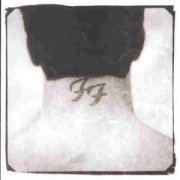 |
There is Nothing Left to Lose (1999, 50.09) ***/½ |
|
| Stacked Actors Breakout Learn to Fly Gimme Stitches Generator Aurora Live-in Skin Next Year |
Headwires Ain't it the Life M.I.A. |
|
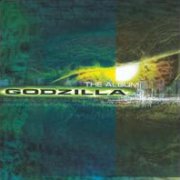 |
Godzilla: The Album (1998) ***/T[Foo Fighters contribute]A320 |
Current availability:
Mellotron/Chamberlin used:
If Dave Grohl's Foo Fighters are the living legacy of Nirvana, then I'm a Chinaman, as the saying goes. Their third album, There is Nothing Left to Lose, is a commercial pop-rock record with slight punky overtones, which is probably why they're as huge as they are; you can sing along to everything here, should you feel so inclined, even more than you could with Nirvana. It's not actually a bad record, but it's not a particularly good one, either, being just too bland and mainstream to really make an impact. Er, except that it did, but you know what I mean. Mellotron flutes on Next Year from Grohl, with an understated flute part running under most of the song, though I can't say it especially enhances it.
Now we have a little conundrum. The Foos released a double-disc set in 2005, In Your Honor, split between electric and acoustic discs, on which no less a personage than John Paul Jones supposedly plays Mellotron. Various online sources quote Jones as playing the Great White Beast on Miracle (nope: piano), Another Round (mandolin?) and something called Oh Yeah, which isn't on the tracklisting. It turns out that it didn't make the cut, so unless it appears on an outtakes album at some point in the future, we may never know whether JPJ, given his notorious antipathy to the Mellotron, actually dusted one off for the session or not.
See: Samples etc. | Godzilla
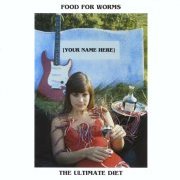 |
The Ultimate Diet (2000, recorded 1981-84, 74.00) ***½/½ |
||
| All You Need is Jazz Cream Always Rises Pink Dishes Cosmo's Credo Mr. Twister We Represent the Symbol First Grade The Worm is the Word Child's Play |
Out of True Moderately Severe Another Still Nite Diet of Worms No Idea Gloom Club No One Said it'd Be Easy Weather is Permanent How I Spent My Summer Vacation |
It Needs a Haircut It Takes a Summer Job Johnny Vette Neil's Stick Primal Bridal Passion Privilege Kiss of Death Los Gusanos |
|
Current availability:
Mellotron used:
This odd little item came free with an issue of US prog mag Progression, turning out to be the entire collected works of an early-'80s outfit that grew out of mental Baltimore proggers OHO, all tracks recorded between 1981-84. The band tell me that the first thirteen tracks were lined up for release at the time, but it never happened.
Fittingly, given when they were active, Food for Worms have that quirky 'new wave' sound about them: short but action-packed songs, vocals that owe a not-so-minor debt to Talking Heads et al. and the then-fashionable Farfisa organ. Plenty of squelchy synths, jagged rhythms and general weirdness, but the only Mellotron (from Mark O'Connor) is the faint background choirs on opener All You Need Is Jazz, doubled with real voices (thanks, Jay). This is currently available through the The Orchard label, in case you're trying to find a copy.
 |
Hot Girl in the Limo (2006, 30.34) **/TParking GarageWaiting for You Hot Girl in the Limo Hey Man Everyone's Allison Strawberry Queen Cosmic Flirt Pastel Shapes in the Sky Love is Wicked Deadly |
Current availability:
Mellotron used:
Austin, TX's For Her & the Snow were (are?) effectively Joe Presti's solo project, his/their 2006 debut, Hot Girl in the Limo, being an odd combination of then-current indie and occasional older influences. Better material includes the crunchy title track and Everyone's Allison, but too many songs only serve to irritate, notably closer Love Is Wicked Deadly.
Rick Steff (Orange Humble Band, others) plays Ardent Studios' M400 on Everyone's Allison, with a beautifully arranged flute part running right through the song and a string line towards the end. Can I recommend this? Really? Maybe the Mellotron track.